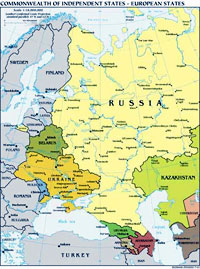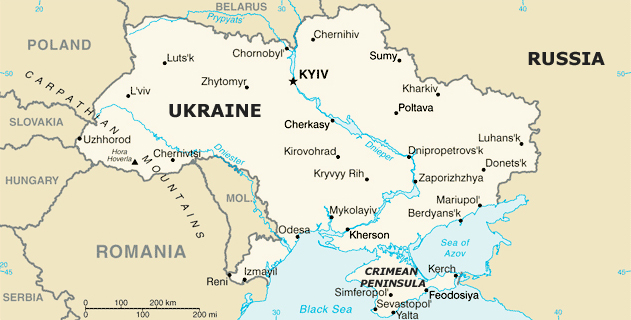Moscow Opens Terrorist Training Base in Crimea, Cemilev Says

(Eurasia Daily Monitor: Volume 11, Issue 119 – Jamestown Foundation – jamestown.org – Paul Goble – July 1, 2014)
Ukraine’s intelligence service has identified five centers within the Russian Federation where Moscow is recruiting and training mercenaries and diversionists to work against Ukraine in the eastern portions of that country and perhaps further west as well (Newsru.ua, June 28). Even more worrisome, according to Mustafa Cemilev, the longtime leader of the Crimean Tatars, Moscow has also established a terrorist training center in occupied Crimea (Un.ua, June 26). And that center appears likely to cause even more trouble for Crimea, for Ukraine and for other countries as well.
Cemilev says that “Crimea now has become one of the bases for the preparation of terrorists and their transfer to other regions of Ukraine with the goal of destabilizing and dismembering Ukraine.” But he also points out that such people are behind the disappearances and other forms of violence in Russian-occupied Crimea. And while the Crimean Tatar leader does not say so, Moscow appears to be using this base both to confuse Western governments, which do not recognize the Anschluss, and to allow Moscow to insert its own special operatives into Western countries.
The Crimean Tatar leader spoke about this danger during a discussion at the Parliamentary Assembly of the Council of Europe on the political and humanitarian consequences of the Russian Anschluss of Crimea and Moscow’s continuing intervention in Ukraine. Cemilev said that it is now difficult to track everything the Russian occupation authorities are doing, because the media on the peninsula are “completely under the control” of the occupiers, and those who oppose Moscow’s actions are under constant supervision and increasingly tight control.
The threat of a Moscow-run terrorist training center that Cemilev described, along with other Russian actions in Crimea, is now so great to the occupied peninsula that a group of specialists on the North Caucasus warned that if the Russian force structures continue in this direction, they will end up radicalizing the Muslim population of the peninsula in much the same way that Russian actions already have done in the North Caucasus (Caucasian Knot, June 27).
One might think that would be the last thing the Russian occupation authorities or Moscow would want, but in fact they may be making the cynical calculation that any rise of radicalism in Crimea will allow them to present Russian forces as the defenders of order against Islamist violence. By so doing Moscow also counts on escaping even more Western criticism of the occupation, if and when Russian forces engage in an even more violent crackdown against Muslims in general and the Muslim Crimean Tatars in particular. At present, that is all too real a possibility. According to one Russian commentator notorious for his close ties to the Moscow Patriarchate of the Russian Orthodox Church and supposed links to the Russian security agencies, the Federal Security Service (FSB) is now preparing to act according to just such a scenario (Window on Eurasia, June 30).
But there is an even more ominous possibility arising from the establishment of the terrorist training center to which Cemilev has pointed. According to Sergey Rekeda, head of Moscow State University’s Information-Analytic Center for the Study of the Post-Soviet Space, Lithuanian officials, who are taking in Crimean Tatars refusing to accept the Russian annexation of their homeland, are putting their country at risk of penetration by radical Islamist groups like Hizb ut-Tahrir (Regnum.ru, June 27).
Rekeda’s argument is certainly part of Moscow’s effort to keep Western countries from helping the Crimean Tatars in any way. But given that Russian media have often unintentionally signaled what Moscow plans to do by such reporting, it is entirely possible that the Russian special services running the center in Crimea may use it as a means for its operatives to penetrate other countries under the cover of being Crimeans. These operatives can then engage in intelligence operations or even violence in these countries with Moscow simultaneously gaining plausible deniability, calling the judgment of a Baltic government into question, and blackening the reputation of the Crimean Tatars in the West.
If even some of these possibilities occur, organizing the kind of terrorist training center Cemilev points to is not only a violation of international law and a threat to the stability of Crimea, Ukraine and Eastern Europe, but its operation may prove to be far more dangerous over the longer term than the Russian recruitment centers in Pskov, Taganrog, Rostov oblast, Krasnoyarsk kray, and just outside of Moscow. Given the violence raging in eastern Ukraine, it is far too easy to overlook what continues to unfold in Crimea. Cemilev’s words are a reminder of why that would be both a mistake and a disaster.

